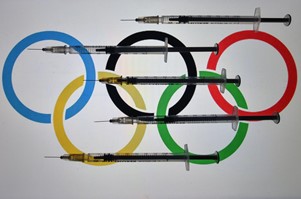Tokyo Olympics Should Require Vaccines For Everyone Going To The 2020 Summer Games

(May 18, Forbes)Pfizer and BioNTech are donating doses of their Covid-19 vaccine to athletes and delegations heading for the Tokyo Olympic and Paralympic Games this July. With so many people around the world still waiting for a jab and the pandemic not letting up in more than a few regions, should Olympians be jumping the vaccine line? Yes—and they ought to get a running start with a tough, mandatory program as soon as possible.
The offer to donate the doses came up during a recent conversation that Pfizer CEO Albert Bourla was having with Japanese Prime Minister Suga Yoshihide. That led the Japanese government into discussing the opportunity in a meeting with the International Olympic Committee. The IOC then worked with Pfizer and BioNTech on a memorandum of understanding. It will have National Olympic Committees across the globe—206 in all—coordinate with their local governments to administer vaccinations to athletes and delegates who are eligible for them. Given the two-shot schedule, they need to start now.
Japan is planning to host a total of about 15,000 athletes at the Olympic and Paralympic Games. Several thousand more people who will travel as part of the delegations will join them, even as numbers are limited due to pandemic regulations. Some of those heading to Tokyo will have been vaccinated already. Many, however, will have not yet had access to a vaccine. Others will have refused to take it because they are hesitant or don't believe in its safety.
How many thousands of doses will end up being provided to the Olympic movement remains to be seen. Pfizer, BioNTech, and the IOC have said that those doses will be in addition to amounts already set to be supplied to different countries. But many people are wondering, if the pharmaceutical firms can produce extra vaccines for Olympic allotment, shouldn't those doses go to people who are at greater risk for severe illness or death if they contract Covid?
That is a fair question, but it misses an important reality: the Games are on pace to take place as-scheduled. This despite the fact that Tokyo and surrounding prefectures are under a government-mandated state of emergency because of high Covid infection rates. But Japan is too far down the road to cancel the Games, which were already postponed once.
At a cost of more than $26-billion, the coming version of the Tokyo Olympics is the most expensive Summer Games ever. True, a majority of the Japanese public—about 60%, according to Yomiuri Shimbun polling, and up to 80%, according to polls cited by the Associated Press—is against holding the Games. Doctors and nurses are protesting, and employees in at least one hospital posted signs in windows pleading for the Games to be cancelled, because of overcapacity. But the money invested, not public health concerns, are now driving events. Unless a shock catastrophic event takes place, the Games will go on.
The Olympic festival, its athletes and delegates, and registered media and broadcast teams will be flowing into and around into Japan in late-July. Even if Tokyo reduces the infection rate to a more manageable level in time for Opening Ceremonies, allowing thousands of unvaccinated people to enter and move about is irresponsible. It risks real strain on health care and public safety systems in the Olympic venues and throughout the city, in a nation that has one of the highest rates of vaccine hesitancy and lowest rates of vaccine confidence in the world.
The IOC will not be requiring athletes and delegates to have received a vaccine in order to participate in the Games. That is flat out wrong, given the danger of spreading new strains around the world when participants return home from the Games. Athletes, coaches, delegates, media, and suppliers, should be required to take the two-shot vaccine doses being offered by Pfizer-BioNTech. There is a need to keep as many people as safe as possible, and vaccines can help greatly in that regard.
Authentication by a physician that a person has been vaccinated a minimum of one month before the Games should be part of the protocol. So should frequent testing just prior to departure, on arrival, and throughout the Games, as should maintaining a tight bubble at all Olympic sites, venues, and lodgings.
Olympic athletes and their support staff can be considered “essential workers,” in that their participation in the Games can be seen by the world as a sign of good things happening in a bleak time. As IOC President Thomas Bach said, they can “lead by example … and send a powerful message that vaccination is not only about personal health, but also about solidarity and consideration of the wellbeing of others in their communities.”
Arguing about cancelling the Games is over. They are going to happen. The organizers and athletes have about one month from now to insure their safety, the safety of Tokyo, and the safety of the world. Vaccination, testing, and quarantine are the key tools to aligning public health with the world’s desire for a bit of relief from a deadly plague. Let’s hope the IOC, local organizing committee, and Japan get this right.
The IOC tends to discourage participants from taking injections. It doesn't want whatever agent is in the syringe to intrude on the sanctity of the Olympics and Olympism. But, on the road to Tokyo, to promote the safety of the Games, the IOC is right to get as many vaccine jabs to participants as possible.



